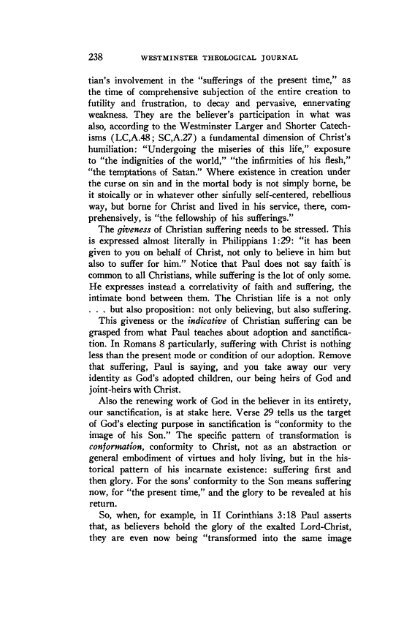NEW TESTAMENT THEOLOGY
Issues%20in%20New%20Testament%20Theology
Issues%20in%20New%20Testament%20Theology
You also want an ePaper? Increase the reach of your titles
YUMPU automatically turns print PDFs into web optimized ePapers that Google loves.
238 WESTMINSTER THEOLOGICAL JOURNAL<br />
tian's involvement in the "sufferings of the present time," as<br />
the time of comprehensive subjection of the entire creation to<br />
futility and frustration, to decay and pervasive, ennervating<br />
weakness. They are the believer's participation in what was<br />
also, according to the Westminster Larger and Shorter Catechisms<br />
(LC,A.48; SC,A.27) a fundamental dimension of Christ's<br />
humiliation: "Undergoing the miseries of this life," exposure<br />
to "the indignities of the world," "the infirmities of his flesh,"<br />
"the temptations of Satan." Where existence in creation under<br />
the curse on sin and in the mortal body is not simply borne, be<br />
it stoically or in whatever other sinfully self-centered, rebellious<br />
way, but borne for Christ and lived in his service, there, comprehensively,<br />
is "the fellowship of his sufferings."<br />
The giveness of Christian suffering needs to be stressed. This<br />
is expressed almost literally in Philippians 1:29: "it has been<br />
given to you on behalf of Christ, not only to believe in him but<br />
also to suffer for him." Notice that Paul does not say faith is<br />
common to all Christians, while suffering is the lot of only some.<br />
He expresses instead a correlativity of faith and suffering, the<br />
intimate bond between them. The Christian life is a not only<br />
. . . but also proposition: not only believing, but also suffering.<br />
This giveness or the indicative of Christian suffering can be<br />
grasped from what Paul teaches about adoption and sanctification.<br />
In Romans 8 particularly, suffering with Christ is nothing<br />
less than the present mode or condition of our adoption. Remove<br />
that suffering, Paul is saying, and you take away our very<br />
identity as God's adopted children, our being heirs of God and<br />
joint-heirs with Christ.<br />
Also the renewing work of God in the believer in its entirety,<br />
our sanctification, is at stake here. Verse 29 tells us the target<br />
of God's electing purpose in sanctification is "conformity to the<br />
image of his Son." The specific pattern of transformation is<br />
conformation, conformity to Christ, not as an abstraction or<br />
general embodiment of virtues and holy living, but in the historical<br />
pattern of his incarnate existence: suffering first and<br />
then glory. For the sons' conformity to the Son means suffering<br />
now, for "the present time," and the glory to be revealed at his<br />
return.<br />
So, when, for example, in II Corinthians 3:18 Paul asserts<br />
that, as believers behold the glory of the exalted Lord-Christ,<br />
they are even now being "transformed into the same image


